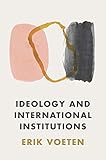Ideology and international institutions / by Erik Voeten.
Material type: Computer fileLanguage: English Publication details: New York : Princeton University Press, 2021Description: 1 online resource (xiii, 242, pages) : color illustrationsContent type:
Computer fileLanguage: English Publication details: New York : Princeton University Press, 2021Description: 1 online resource (xiii, 242, pages) : color illustrationsContent type: - text
- computer
- online resource
- 9780691207339 (e-book)
- JZ4850 V85 2021
| Item type | Current library | Collection | Call number | Materials specified | Status | Notes | Date due | Barcode |
|---|---|---|---|---|---|---|---|---|
 Online E-Books
Online E-Books
|
Ladislao N. Diwa Memorial Library | Non-fiction | OEBP JZ4850 V85 2021 (Browse shelf(Opens below)) | Available | PAV | OEBP000211 | ||
 Compact Discs
Compact Discs
|
Ladislao N. Diwa Memorial Library Multimedia Section | Non-fiction | EB JZ4850 V85 2021 (Browse shelf(Opens below)) | Room use only | PAV | EB000211 |
Browsing Ladislao N. Diwa Memorial Library shelves, Collection: Non-fiction Close shelf browser (Hides shelf browser)

|

|

|

|

|

|

|
||
| OEBP JN30 So6 2022 Splitting Europe : the EU, Russia, and the West / | OEBP JZ1253 J63 2020 Strategic instincts : the adaptive advantages of cognitive biases in international politics / | OEBP JZ1305 N42 2021 A new theory and practice of diplomacy : new perspectives on diplomacy / | OEBP JZ4850 V85 2021 Ideology and international institutions / | OEBP KF1600 L75 2020 Reviving rationality : saving cost-benefit analysis for the sake of the environment and our health / | OEBP KF1893 M83 2020 Biotechnology law : a primer for scientists / | OEBP KF2980 F24 2020 Patents for power : intellectual property law and the diffusion of military technology / |
https://www.universitypressscholarship.com/
Includes bibliographic references and index
1. Introduction -- 2. Global ideological conflict : concept and measurement -- 3. Ideology and theories of international institutions -- 4. A spatial modeling framework -- 5. Expertise, ideology, and distributive politics -- 6. Ideological structure and membership in international institutions -- 7. Ideology, institutions, power, and militarized disputes -- 8. Ideology and the investment regime -- 9. Populism and backlashes against international courts 10. Conclusion : implications for the liberal international order
Today's liberal international institutional order is being challenged by the rising power of illiberal states and by domestic political changes inside liberal states. Against such a backdrop, this book offers a broader understanding of international institutions by arguing that the politics of multilateralism has always been based on ideology and ideological divisions. The book develops new theories and measures to make sense of past and current challenges to multilateral institutions. It presents a straightforward theoretical framework that analyzes multilateral institutions as attempts by states to shift the policies of others toward their preferred ideological positions. It then measures how states have positioned themselves in global ideological conflicts during the past seventy-five years. Empirical chapters illustrate how ideological struggles shape the design of international institutions, membership in international institutions, and the critical role of multilateral institutions in militarized conflicts. The book also examines populism's rise and other ideological threats to the liberal international order. It explores the essential ways in which ideological contestation has influenced world politics.
Fund 164 CE-Logic Purchased Feb 16, 2022 OEBP000211 P. Roderno PHP 6,110.40
2022-02-057 22-1054

